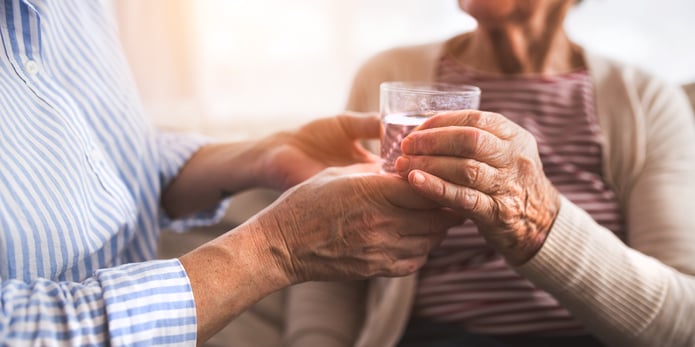
As we age, our bodies undergo changes, including a natural decrease in water content, but seniors may not feel as thirsty as they used to, making it easier to forget to stay hydrated.
In this article, we shed some light on the common causes, symptoms, and preventive measures that can help our seniors stay hydrated and vibrant.
Why Dehydration is So Common in the Elderly (And What to Look For)
Dehydration occurs when you lose more water than you take in, and it only takes minor fluid loss to create major health issues. Studies have shown that just a two-percent drop in body water can cause fuzzy memory, trouble with basic math, and problems focusing on a computer screen or printed page.
For seniors, dehydration is common for a number of reasons: seniors have a reduced sense of thirst so it’s easy to forget to drink enough, some medications have a diuretic effect, some may cause patients to sweat more, frail seniors have a harder time getting up to get a drink when they’re thirsty, and as we age our bodies lose kidney function and are less able to conserve fluid. Illnesses, especially those that induce vomiting and/or diarrhea, can also cause dehydration.
Not surprisingly, dehydration is one of the most prevalent reasons for hospitalization among people over 65. Dehydration among seniors is more than just dry mouth and fatigue — it can lead to some serious complications like urinary tract infections, kidney stones, and even the dreaded heatstroke. Yikes! Recognizing the subtle signs of dehydration is the key to catching it before it wreaks major havoc on the body.
8 Signs of Dehydration to Watch For
The severity of symptoms can vary depending on the individual and the extent of dehydration, here are some typical signs to watch out for.
- Thirst: Feeling thirsty is the body's way of signaling that it needs more fluids. However, in seniors, the sensation of thirst may be diminished, making it crucial to encourage regular fluid intake even if they don't feel thirsty.
- Dry Mouth and Lips: Dryness in the mouth and lips is a common early sign of dehydration. If the mouth feels sticky or the lips appear cracked, it's a good indicator that the body needs more fluids.
- Dark-colored Urine: Monitoring the color of urine can provide valuable insights into hydration levels. Dark yellow or amber-colored urine suggests concentrated urine due to insufficient water intake.
- Fatigue and Weakness: Dehydration can lead to feelings of fatigue, weakness, and a general lack of energy. If a senior seems unusually tired or lethargic, it may be a sign that they need to hydrate.
- Dizziness and Lightheadedness: Dehydration can cause a drop in blood pressure, leading to dizziness or lightheadedness. Seniors experiencing these symptoms should be encouraged to drink fluids and rest.
- Confusion and Irritability: In more severe cases of dehydration, seniors may exhibit confusion, irritability, or changes in mood. Dehydration can impact cognitive function, so it's crucial to address hydration needs promptly.
- Dry Skin and Reduced Elasticity: Dehydration affects the skin's elasticity, making it appear dry, less supple, and lacking the usual bounce. Pay attention to any changes in the skin's texture and moisture levels.
- Decreased Urine Output: A decrease in urine output or infrequent urination can be a sign of dehydration. Seniors should aim for regular, adequate urine output to ensure proper hydration.
Caregiving can be physically and emotionally demanding. It is essential for caregivers to take care of themselves. This includes getting enough sleep, eating a healthy diet, and exercising regularly.
7 Tips for Encouraging Hydration
So, how do you encourage hydration? Here are 7 tips we’ve found helpful for encouraging increased fluid intake with seniors:
- Set a regular fluid intake schedule: Establishing a routine for drinking fluids can be helpful, especially for seniors who may have a diminished sense of thirst. Encourage them to drink fluids at specific times throughout the day, such as with meals or during medication routines.
- Offer a variety of beverages: Provide a range of beverages to make hydration more enjoyable. Water is essential, but consider offering alternatives like herbal teas, flavored water, or diluted fruit juices. Experiment with different flavors to find what they prefer.
- Keep fluids easily accessible: Ensure that water or other preferred beverages are within reach at all times. Place water bottles or cups in convenient locations throughout their living space, making it easy for them to grab a drink whenever they feel thirsty.
- Use appealing containers: Invest in colorful, easy-to-hold water bottles or cups with straws or spouts. Seniors may find these more appealing and convenient to use, increasing their willingness to drink.
- Offer hydrating foods: Many fruits and vegetables have high water content and can contribute to hydration. Include water-rich foods like watermelon, cucumbers, oranges, and soups in their diet to supplement fluid intake.
- Offer flavored ice treats: Prepare homemade popsicles or freeze fruit slices in water to create refreshing, hydrating treats. These can be a fun and tasty way to increase fluid intake, especially during warmer months.
- Reminders and visual cues: Set up reminders or visual cues around their living space to prompt them to drink fluids. This can be as simple as sticky notes or alarms on their phone or using a colorful chart to track daily fluid intake.








